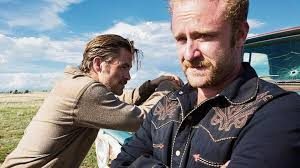Our Characters and Ourselves
I’ve been thinking about an obscure point of storytelling, and I wonder if this isn’t something that a lot of us have been aware of but maybe haven’t thought about too deeply.

Chris Pine and Ben Foster in “Hell or High Water”
(I’m gonna get a little writer-wonky in this post, so please bear with me.)
We know as fiction writers that our story (Act One) starts in “the Ordinary World.”
Then something happens (the Inciting Incident) that propels our hero out of her or his everyday life and into “the Extraordinary World.”
Dorothy is whisked away from Kansas, Luke bolts from the planet Tatooine, Wonder Woman leaves the island of the Amazons.
What happens then?
Usually we conceive of Act Two, the Extraordinary World, as a sequence of obstacles that our protagonist must overcome. It’s her hero’s journey. It’s her struggle to restore some form of equilibrium to her world.
Maybe I’m the last one to catch onto this, but lately I’ve been thinking of this passage in a different light.
The light of “knowing.”
What happens to our hero first, as she is propelled into the Extraordinary World, is that people see her immediately in a wholly different way. Not the way others perceived her or related to her before.
Think of Dorothy or Luke or Diana. Or Michael Corleone after he kills Sollozzo and police captain McCluskey. Or Toby Howard (Chris Pine) in Hell or High Water after he and his brother Tanner (Ben Foster) start pulling off bank robberies.
In the Extraordinary World, these characters are perceived at once and by everyone in an entirely different way.
And they react to this.
They react positively.
They become empowered by it.
Each of our heroes realizes that he or she is someone else, or at least seems to every other character to be someone else.
A strong case could be made that this is the point of the whole story, of every story.
Our narrative—any narrative—is about the hero’s journey from one self-conception (an obsolete, no-longer-working version) to another (brand-new, scary-but-absolutely-necessary) version.
Confronting the challenges of the Extraordinary World, our hero comes to know herself in a way she never did before. She discovers a new self, a just-now-being-born self, and she comes to embrace it as the answer to her dilemma.
This happens in real life too.
We fall in love.
We take a new job.
We move to a new country.
At once, everyone we meet sees us with different eyes.
We perceive this ourselves. We react to our new challenges not as our old selves but as this newly-hatched, revised-and-updated version of ourselves.
Of course this happens to us as artists every time we embark on a new project. We’re writers. Our Muse is calling us to shed an old skin and grow a new one.
Each new book, play, or screenplay is a new hero’s journey, a fresh crossing of the threshold into an ever-different Extraordinary World.
I’m working on something new now, and I’m trying to apply this (new-for-me) insight to it.
When my hero crosses the threshold into the Extraordinary World (I’m asking myself as I evaluate what I’m writing), do the other characters in the story perceive him and relate to him differently than they would have, had they encountered him in the Ordinary World? Does he see this? How does it affect him? Is he in fact different? How? Why?
Who is his old self?
Who is his new one?
I’m asking this of myself as well, as I too cross into my own Extraordinary World.
Will a new me appear? Has it already?
Who is he?
How is he different?
In the end, our stories and our real lives are about our heroes (and we ourselves) incorporating this new knowing, this novel self-knowledge, and growing and changing with it.
 newest »
newest »
 Loved the post! Thought provoking!
Loved the post! Thought provoking!



